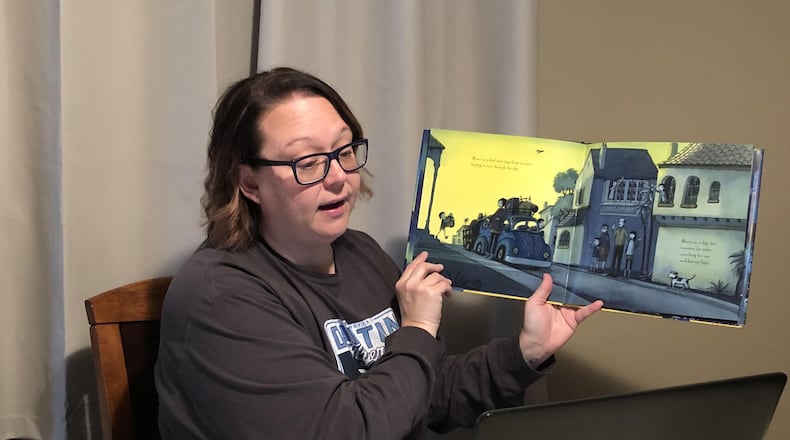RELATED: State testing delayed, could be canceled this year
“Since we do not have 100% of our students with (online) access, we decided to create paper/pencil educational packets to best meet the needs of our community,” Mad River Superintendent Chad Wyen said. “Although our certified staff are working from home, they are available to students through email, Remind, Classdojo, or our Blackboard communication tool.”
Schools are providing students specific subject and grade-level lessons designed by their own teachers, as well as links to broader online enrichment options from outside sources such as museums and libraries.
A single master schedule on Dayton Public Schools’ site lists specific lessons for each day that were videotaped by DPS staff — math and English video lessons for each grade 3-10, read-aloud and phonics lessons for younger students, and reading, science and social studies videos for high schoolers.
“We have basically used every means possible (to communicate this with families) — robocalls, texts, social media, emails, individual schools have communicated, and it’s on the website,” DPS spokeswoman Alex Kincaid said Thursday.
RELATED: Families adjusting for weeks of school closures
Oakwood’s website has a link for each school, where each grade or classroom explains how it is proceeding — some based on packets students took home March 13, and others getting regular emails or updates via Google Classroom.
Smith Elementary first-graders have to do some traditional work (math problems and a summary worksheet on a book), but other assignments include going outside to analyze their shadow’s movement for science, and executing a recipe with a family member to use reading, measurement and other skills.
Oakwood High School geometry teacher Ian Callon recorded a brief video explaining how students should use specific Khan Academy videos and practice problems tied to what they’ve been learning. Callon told students it’s about 30 to 40 minutes of work a day, and they can email him for help during normal school hours.
Most schools have said teachers will be available to answer student questions via email or other communication platforms. A note from Beavercreek leadership to teachers recommended certain morning and afternoon “office hours” with an expectation that they respond to student questions within 24 hours.
RELATED: Ohio has 119 confirmed cases; rising about 33% per day
One of the big questions will be how schools grade the work that students do from home, with much less teacher contact than they’re used to. Kincaid said Dayton students won’t be graded on any work from current online lessons. The assignments Oakwood listed included a mix of graded and ungraded work. Springboro, which began online school assignments Friday, says it is holding off on any grading decision.
Wyen said Mad River will grade students’ three-week take-home packets, but they’re still working on how fourth-quarter grades and credits will compiled.
Lebanon Superintendent Todd Yohey said students “will be held accountable for participating in their learning,” but added that the details may vary depending on grade level and academic course.
“We are waiting on decisions from ODE to determine grades/course credits for 4th quarter,” Yohey said.
Many students likely won’t spend as much time on academics as they would during normal school. The videos Dayton already has on its website are fairly short. Beavercreek’s note to staff suggested providing 10-20 minutes of work per day, per course.
RELATED: Restaurants, which employ 1 of 10 Americans, seek bailout
But Springboro schools officials said the goal is for students to be prepared when they return to school.
“Students are expected to turn in their assignments. Teachers will be expected to provide necessary feedback to students during the day,” the district said in a note to families. “The district recognizes that our families will be undergoing difficult circumstances during this time, which is why our teachers and staff will remain flexible on due dates (and) there will be opportunities for students to redo assignments.”
Schools’ online education efforts also will be affected by the timing of their spring breaks. Kettering, Piqua and Waynesville schools were on break the past week. More than a dozen districts — including Dayton, Beavercreek, Lebanon and Tipp City — are off this week, and several others have their breaks the week of March 30.
Currently, schools are scheduled to resume regular classes the week of April 6, but more than a dozen districts have spring break that week too, including Huber Heights, Springboro, Miamisburg and Troy.
Milton-Union schools are one of three locally whose break is the week of April 13. Superintendent Brad Ritchey said this week there are no plans to change that schedule.
“We realize so many people have already made plans based on the existing school calendar,” Ritchey said.
About the Author

